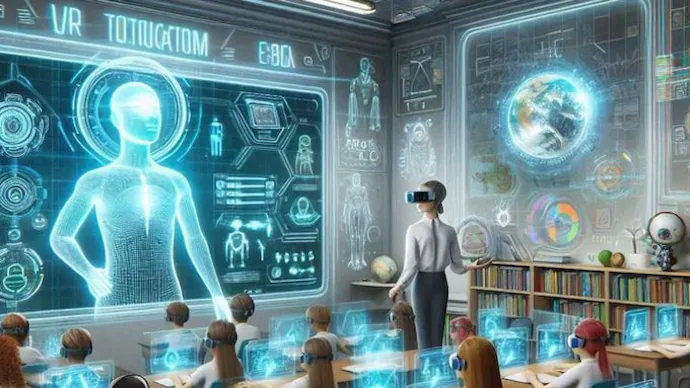Beyond Automation: How AI is Reshaping Classroom Management for Educators
Artificial intelligence (AI) is transforming education in multiple ways, from personalizing learning experiences to managing administrative tasks. In the realm of classroom management, AI offers tools that can handle everything from tracking student attendance to analyzing participation. With these advancements, some wonder if AI could eventually take over classroom management entirely and possibly even replace teachers. This prompts an important question: can AI replace teachers, or is it best seen as a tool to enhance their effectiveness? This article explores how AI is reshaping classroom management and why teachers remain essential in maintaining a balanced, supportive learning environment.
The Role of AI in Modern Classroom Management
AI in education has opened up new possibilities for streamlining classroom management and supporting teachers with daily administrative tasks. Here are some key ways AI is helping educators manage classrooms more effectively:
- Automated Attendance TrackingAI-powered systems can automatically track attendance, allowing teachers to save time and focus more on teaching. Using facial recognition or smart ID scanning, these systems instantly mark students present or absent, reducing the paperwork that traditionally comes with attendance management.
- Behavioral Monitoring and InterventionCertain AI tools can analyze student behavior and detect patterns that may indicate challenges with focus or participation. Teachers receive insights from these tools, allowing them to intervene early when students appear disengaged or face challenges.
- Efficient Grading and FeedbackAI-powered grading systems assist teachers by automating grading processes for assignments and quizzes, especially for multiple-choice or fact-based questions. By reducing the time spent on grading, teachers can focus more on personalized instruction and feedback.
These capabilities make AI a valuable tool in classroom management, giving teachers more time to engage directly with students. However, while AI handles tasks efficiently, can AI replace teachers in overseeing a classroom environment fully?
The Human Element in Classroom Management
While AI brings valuable efficiency, classroom management goes beyond automated tasks; it requires human insight, adaptability, and interpersonal skills that AI cannot replicate. Here’s why teachers are still essential to effective classroom management:
- Building Trust and RespectTeachers establish trust and respect with their students, creating an environment where students feel comfortable and engaged. Effective classroom management is based on this foundation of respect, which AI systems cannot foster. AI lacks the emotional intelligence to form these connections, leaving a gap that only human interaction can fill.
- Addressing Behavioral Challenges in Real-TimeClassroom behavior can shift unexpectedly, and teachers must adapt their approach to keep students focused and engaged. When disruptive behavior arises, teachers use their experience and intuition to address it appropriately, balancing discipline with empathy. AI tools can signal when behavior is off-track, but they lack the context to respond with understanding.
- Encouraging Student MotivationTeachers play a motivational role, encouraging students to take pride in their learning and to pursue their potential. This often requires a personal touch—knowing when a student needs encouragement, support, or even a gentle push. AI systems, though capable of monitoring academic progress, cannot provide the emotional encouragement that inspires students to excel.
These aspects demonstrate that teachers bring unique qualities to classroom management, creating an environment that supports students’ emotional and social well-being.
AI as a Tool, Not a Replacement
Instead of viewing AI as a substitute, it’s more productive to see it as a tool that supports teachers in creating a balanced classroom environment. Here’s how AI and teachers can work together to make classroom management more effective:
- Insights for Proactive Classroom ManagementAI can monitor student engagement levels, highlighting when students may be disengaged or distracted. Teachers can use these insights to adjust their approach, such as introducing more interactive activities or providing additional support to struggling students.
- Streamlined Administrative WorkBy handling attendance, grading, and data analysis, AI allows teachers to focus on meaningful interactions with students. Teachers can spend less time on paperwork and more time on personalized teaching strategies that enhance student success.
- Data-Driven Decision-MakingAI provides data on student performance, behavior, and participation trends, helping teachers make informed decisions about classroom dynamics. These insights allow teachers to tailor their strategies to meet the unique needs of each class, improving the overall learning experience.
AI serves as a tool that enhances classroom management without replacing the teacher’s role. With AI handling repetitive tasks, teachers are free to focus on activities that build a positive, inclusive classroom environment.
Can AI Replace Teachers? Understanding the Balance
The question of “can AI replace teachers” in classroom management highlights the balance between technological efficiency and human interaction. While AI provides automation and data, teaching is not just about managing tasks; it involves building relationships, providing mentorship, and guiding students in their personal growth.
AI cannot replicate the human qualities that make teachers effective classroom managers. Teachers offer compassion, adaptability, and real-time decision-making, all of which are essential for a supportive learning environment. The ability to respond to each student’s needs, to foster respect and trust, and to motivate and inspire is beyond the capacity of AI.
The Limitations of AI in Classroom Management
While AI tools are useful, they come with limitations that underscore the irreplaceable role of teachers in classroom management:
- Lack of Emotional ContextAI systems can track behavior but lack the emotional context to interpret why a student may be acting out. Teachers use their experience and understanding of individual students to respond appropriately, adjusting their approach based on the student’s emotional state.
- Dependence on Data AccuracyAI relies on data to function effectively. If the data is inaccurate, the AI’s recommendations may not be relevant or helpful. Teachers, however, use real-world observations and intuition, allowing them to act with flexibility even when data is incomplete.
- Ethical Concerns in MonitoringSome AI systems may monitor student behavior closely, raising privacy concerns. Teachers, on the other hand, can monitor classroom dynamics naturally, without intrusive technology that may affect students’ comfort.
These limitations highlight that AI works best as a partner to teachers rather than a replacement. The human touch is still essential for a balanced and ethical approach to classroom management.
Conclusion: A Collaborative Approach to Classroom Management
In conclusion, while AI offers remarkable tools for classroom management, it is not a replacement for human teachers. The question “can AI replace teachers” is about more than technology’s capabilities; it’s about understanding the irreplaceable qualities teachers bring to the classroom. AI can handle data-driven tasks, but it cannot build relationships, offer mentorship, or foster a positive learning atmosphere.
The future of classroom management lies in a collaborative approach where AI supports teachers without replacing them. By combining AI’s capabilities with the empathy, adaptability, and intuition of human teachers, we create a learning environment that benefits from the best of both worlds.
Also Check Our Other Articles:
IELTS Preparation: Your Guide to Success














Post Comment